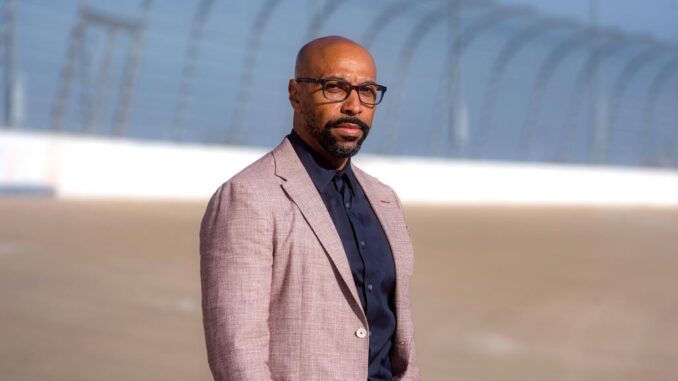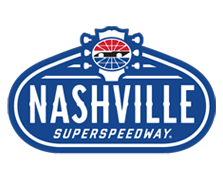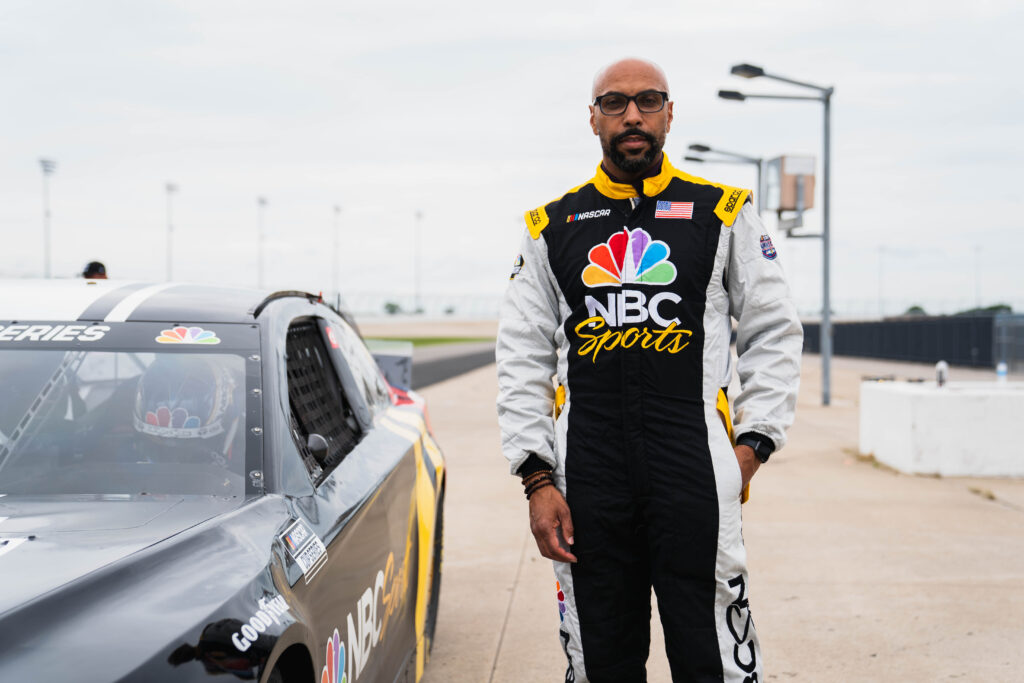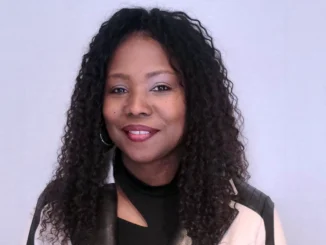
By: Kymberly Amara
One of one. Being the first and only to do anything comes with a great deal of responsibility. The current President of Nashville Superspeedway, Erik A. Moses, isn’t new to the challenges and responsibility of knocking down doors and shattering glass ceilings. His great uncle, J. Kenneth Lee, was one of the first Black students to desegregate the University of North Carolina School of Law. Heart&Soul had the privilege of speaking with Moses as he charts his own path and created history as the first Black track president in history.
On getting involved with The National Association for Stock Car Auto Racing
There are more of us in the sport and motorsports than you think. Because most of us have never been to a track and most of us don’t really have a sense of that, but there are more of us in this sport than most of us think. I wasn’t necessarily drawn to motorsports or Nascar in particular. I am a professional sports executive. I ran a professional football team before this, was a sports commissioner in DC for 11 years, and ran multiple venues in the nation’s capital. The primary job as the president of the Superspeedway is running a building and a campus. That is something that I’ve done before, and the fundamentals of that I understood very well.
After being closed for ten years, Moses was drawn to Nashville Superspeedway due to the opportunity to revive a market that had deep ties to the sport and rich NASCAR roots by combining that history with the opportunity to be innovative, creative, and spearhead change.
Reviving the Nashville Superspeedway
There was a three-pronged approach. It was facility first because the place had been closed for ten years, and we needed to make certain that we could be proud of the facility itself when people came to visit. Then we focused on becoming a beloved part of the community and caring for the community. We moved quickly to figure out how we could become an asset and an amenity for Middle Tennessee but, also across the state and the region. We focused on figuring out where we could add value and where we could help in the business, philanthropic, civic, and sports communities. The third thing was to create a winning culture. I want to build a first-class staff with unmatched experience across multiple disciplines. We wanted to establish a culture of creativity and to be able to recognize and respect the traditions of the sport but look for opportunities to marry those traditions with new ways of doing things, new ways of appealing to new fan bases, new audiences, and communities.
The demand for NASCAR to return and the eagerness for people to simply get out of the house was critical for someone like Moses to come in and get it right by striking the right chord. With a focus on attracting top-tier talent and fostering an inclusive and reflective environment of the communities they are looking to engage, his team sold out the inaugural event that brought NASCAR back to Nashville for the first time in 37 years. As he enters year two, Moses’ goal is to deepen relationships with fans, ticket buyers, and patrons by giving them an experience they feel they simply cannot miss.
On being the first Black track president
When discussing what his journey has been , Moses says, It’s been great. I think that often people expect me to have a Jackie Robinson story, and I don’t. The industry has been very welcoming. I have friends all around the country who do what I do and are engaged in other parts of this sport, who I can call anytime for advice and have already made me feel a part of this industry. That includes hall of fame drivers, broadcasters, folks who run other tracks, and people who run the sanctioning body – NASCAR itself. I have been welcomed with open arms in this sport, and it has also been the case in Nashville. People like what we’re doing. I find this city to be one where if you’re talented and have good ideas and are trying to bring more things to this city, they will encourage you. I’ve gotten that encouragement. I have not received any criticism tied to my blackness nor really even any backlash because I am an outsider to the sport.
On bringing more diversity to the sport
While there is a common notion that motorsports is an overwhelmingly white sport, Moses says that case can be overstated and that it’s mainly about exposure.
I have the opportunity to open people’s eyes. My first trip to a track was in October of 2019 in Dover, and I was amazed at how brown, young, and female the crowd was compared to my very low expectations. Representation matters, and…right now, I think the focus or the misunderstanding of our sport comes from the lack of diverse drivers in our top circuit, the Cup series. We have Bubba Wallace, who is Black. We have Daniel Suarez, a native of Mexico, and we don’t have any women since Danica left the Cup series. There are several women and other people of color on many of the lower developmental circuits but not at the highest level.
Moses is furthering his diversity and inclusion efforts by using his platform to ensure the efforts that are being made across the sport are front and center. NASCAR created a Diversity & Inclusion Council within the sport that includes sponsors, media partners, drivers, team owners, track presidents and NASCAR executives. The Council invites feedback and input from organizations that are much larger than NASCAR to help inform the progress the sport seeks to make across the board. Some of the efforts are focused on making in-roads to diversify marketing efforts including by engaging the support of a more diverse cultural ambassadors like music artists, athletes or entertainers. Moses is also interested in engaging many of the HBCUs to help diversify the fan base.
Last year we partnered with NASCAR DE&I, and with Tennessee State University Alumni Association and Fisk University and brought out over 120 alumni from those institutions to our Xfinity Series race.
This date was particularly special as it was TSU’s 150th anniversary and Juneteenth. Patrons were able to enjoy food and drink from local Black-owned businesses, and gave them a Black experience at the track. This exposure resulted in the majority of the alumni promising to return the following year.
On plans and goals for the future
We’ve got a seven-acre grass in-field inside of our venue. I want to do football games here and soccer tournaments, lacrosse tournaments, and things of that nature. I’d love to have an HBCU classic here or have an HBCU like TSU play a football game here. Part of my challenge is to ensure that we aren’t activating this place for [only] one week in a year but that we keep it really busy as a live event venue all year round. Whether it’s private events or having big car groups like Corvette, Porsche, or Ford , want to come out and use the track, or pursuing large music or cultural festivals…that’s the mission.
As Moses prepares to host their second NASCAR weekend, which kicks off on June 24, 2022, he and the team are focused on making sure it goes smoothly. To learn more about the upcoming events at Nashville Superspeedway, visit their website.
About Erik A. Moses
On August 21, 2020, Dover Motorsports, Inc. (now Speedway Motorsports) named Erik A. Moses President of Nashville Superspeedway, becoming the first Black person to hold that title at any NASCAR track in the sport’s history. Moses is leading the efforts to reopen and revitalize the Nashville Superspeedway – originally opened in 2001 but dormant since 2011. The sold-out inaugural Ally 400 on Father’s Day 2021 marked the first NASCAR Cup Series race for the Lebanon, Tennessee based facility, the first Cup Series race in the Nashville market since 1984 and the first full grandstand sellout for NASCAR since the start of the COVID-19 pandemic.
Prior to joining Speedway Motorsports, Moses served as the founding President of the DC Defenders of the XFL. In that role, he was responsible for all aspects of the team’s business operations and fan engagement, including ticket sales, corporate partnerships, marketing, content, communications and community engagement, and the game day experience.
Over the last decade, Moses served as Senior Vice President and Managing Director of Sports, Entertainment & Special Events for Events DC, where he managed several of its facilities and worked to attract major events to those venues, including Nationals Park, the Walter E. Washington Convention Center, Robert F. Kennedy Memorial Stadium and Festival Grounds, the DC Armory, the Entertainment & Sports Arena, Gateway DC Pavilion, and RISE Demonstration Center. Moses also led Events DC’s corporate partnerships initiative that connected the organization with brands such as AT&T, PepsiCo, Lyft, Red Bull, Hilton, RCN, and the DC Lottery. Before the 2009 merger that created Events DC, Moses was CEO of the DC Sports and Entertainment Commission. In addition to leading its merger with the Washington Convention Center Authority, Moses oversaw the completion of the construction of Nationals Park, the founding, launch and development of the Military Bowl, the creation and launch of the AT&T Nation’s Football Classic, and was the catalyst behind the public-private partnership which developed the Skate Park at RFK Stadium.
Prior to beginning his career in sports and entertainment, he served as the Director of the District of Columbia’s Department of Small and Local Business Development and began his legal career in private practice with Dow Lohnes PLLC. He then joined America Online, Inc. where he served as legal counsel and as a director of business development. Moses has served as Of Counsel at the DC based law firm of Fisch Sigler, LLP and as an adjunct professor in the Sports Industry Management Program at Georgetown University’s School of Continuing Studies. He serves on the board of directors for the DC Jazz Festival, the Military Bowl Foundation, is a member of the NASCAR Industry Diversity Council, the Rotary Club of Nashville, Leadership Middle Tennessee and previously served on board of the US Tennis Association – Mid-Atlantic Section.
Erik received his B.A. in Political Science from the University of North Carolina at Chapel Hill and his J.D. from the Duke University School of Law. He holds an honorary Doctorate of Humane Letters from LeMoyne-Owen College and is a member of the bar in both Maryland and the District of Columbia.
Social Media
Twitter
Instagram:








